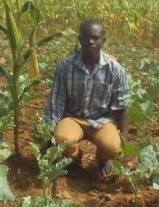K5VILLAGEPROJECT
Meet Us
Omito Abraham Owuor
, planting annual vegetables in our mother’s
kitchen garden.
Then in 2010, in high school, I become more interested
in general agriculture as a subject dealing with
crop and animal production. I quickly became head of the
Food Department at my school.
farming because they had been using “modern” farming techniques –
vast monocrop areas that, because of the terrible amount of exposed soil,
required more water than the local aquifer and rain could provide (not to
mention poor farming skills as the community was brought in line with
agrocorp farming techniques).
and many were hungry. However, during that time while I was head of
the Food Department at my school, I had been experimenting with alternative
ways to farm–what I now know is called “Permaculture”.
and techniques I had learned from my experimentations. We applied them
to their traditional small farms, and amazingly, those farms blossomed.
Of course, I wanted to learn more techniques. I just knew that what I’d stumbled
onto could solve my community’s poverty and hunger.
PermoAfrica Centre, and together we learned so much more.
My knowledge and experience grew by leaps and bounds, enough so
that I founded the K5 Village Project.
our community to help farmers learn new techniques, and support local
orphans and widows, I continue to want to expand my knowledge
of Permaculture.
Institute’s Laikipia Permaculture Centre, so that I can earn my
Permaculture Design Certificate (PDC). the PDC,s training school
to acquire more skills and techniques. With that knowledge I will be
better able to teach farmers and design farms in my community
and throughout Kenya. I intend to teach our youth, as well, so they
can aquire these “new” Permaculture methods and technologies.
Everywhere knowledge of Permaculture spreads, famine and poverty
are reduced. This is my goal for my community.

Nenhum comentário:
Postar um comentário